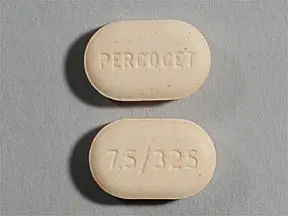


Percocet is a strong pain-relieving medicine. It contains two main ingredients: oxycodone, which is a powerful painkiller, and acetaminophen, which helps reduce pain and fever. People often use Percocet after surgery, for chronic pain, or when they have a serious injury. When you take Percocet by mouth, it goes into your stomach and is absorbed into your bloodstream. From there, it travels throughout your body, including your brain, where it works to relieve pain. Your liver plays an important role in processing Percocet. It breaks down the medicine into different forms that can be eliminated from your body through urine and feces. This elimination process varies from person to person and can affect how long Percocet can be detected in your system.
Knowing how long Percocet stays in your system is important for a few reasons. Firstly, it helps you and doctors to figure out the right dosage to manage your pain effectively while minimizing side effects. Secondly, if you need to undergo drug testing, such as for work or sports, understanding the duration of Percocet in your system is important. Understanding how long Percocet stays in your body system also helps prevent problems when taking other medications. Some drugs can interact with Percocet by affecting how it is processed in the liver, which can cause unwanted effects or change how well the medicine works.
At last, if you want to stop taking Percocet, it’s important to do it gradually under the guidance of a healthcare professional. Suddenly stopping the medication can lead to withdrawal symptoms. Knowing how long Percocet remains in your system helps create a safe plan for reducing and eventually stopping its use.
Percocet is a medicine that helps with strong pain. It has been around for a long time and is commonly prescribed by doctors. It is made up of two main things: oxycodone, which helps with pain, and acetaminophen, which also reduces pain and fever and can be found in other medicines. Doctors often give Percocet to people who have just had surgery because it helps with the pain after the operation. It is also used for people who have ongoing pain from conditions like arthritis or back problems. Sometimes, it’s used for short-term pain relief, like when you break a bone or have a tooth pulled. While Percocet can be helpful, it’s important to know about its possible side effects and risks.

Some common side effects include feeling sleepy, dizzy, or constipated, and sometimes feeling nauseous. If you take too much Percocet or use it with other drugs or alcohol, it can slow down your breathing, which can be dangerous. Using Percocet for a long time can also make you dependent on it, meaning your body gets used to it and you might have withdrawal symptoms if you stop taking it suddenly. It’s really important to use Percocet the right way, just as your doctor tells you. Misusing Percocet or taking it without a prescription can be very dangerous and even lead to an overdose. If you have any questions or worries about Percocet, always talk to your doctor. They will make sure you take it safely and get the best pain relief possible.
When you take Percocet, your body goes through a process to break it down and get rid of it. This process is called metabolism. After you swallow Percocet, it gets absorbed into your bloodstream from your stomach. Then it travels throughout your body, including your brain, where it helps with pain relief. The liver plays an important role in breaking down Percocet. It has special enzymes that work to break down the medicine into different forms. These forms are called metabolites. The liver enzymes change the structure of Percocet so that it can be eliminated from your body.
Once the liver breaks down Percocet into metabolites, they are eliminated from your body through different pathways. One of the main ways is through your kidneys and urine. The metabolites are filtered by the kidneys and then passed out of your body when you go to the bathroom. Some metabolites can also be eliminated through your feces when you have a bowel movement.
In addition to urine and feces, a small amount of Percocet and its metabolites can be eliminated through sweat. However, this is a minor pathway compared to urine and feces. It is also important to note that the rate at which Percocet is metabolized and eliminated can vary from person to person. Factors such as age, liver function, and other medications or substances being taken can influence how quickly or slowly Percocet is processed in the body.
There are a few things that can affect how long Percocet stays in your body:
As we get older, our bodies process medications slower. This means that older adults may take longer to break down and get rid of Percocet compared to younger people.
The amount of Percocet you take and how often you take it can also impact how long it stays in your system. Higher doses and more frequent use can make it take longer for your body to eliminate the drug.
Everyone’s body is different, and that includes how quickly they process and eliminate Percocet. Genetic factors and other physiological differences can affect how long the drug stays in your system.
Your overall health and the function of your liver and kidneys can also influence the time it takes for Percocet to leave your body. If your liver or kidneys are not working well, it may take longer for the drug to be cleared.
Some medications or substances can interact with Percocet and affect how it is processed and eliminated. It’s important to let your healthcare provider know about all the medications and supplements you are taking to ensure they can monitor for any potential interactions.
To find out if Percocet is present in the body, different types of drug tests are commonly used. These tests can detect the presence of Percocet and its byproducts. The main drug tests used to check for Percocet are urine tests, blood tests, saliva tests, and hair tests.
It is important to remember that the detection window can vary from person to person and can be influenced by individual factors. Additionally, advancements in drug testing technology may affect the accuracy and detection capabilities of these tests.
The duration of time that Percocet stays in your body can vary. Based on available research, here are some general estimates:
Remember, these timeframes are approximate and can vary based on factors like metabolism, dosage, frequency of use, and individual health.
Everyone’s body is different, so it’s best to talk to a doctor for accurate information and advice specific to your situation.
Using Percocet for a long time can have risks that you should be aware of. Here are some important points:
Prolonged use of Percocet can lead to dependence and addiction. It contains opioids, which can make your body rely on the medication. It’s essential to follow the prescribed dosage and not take more than recommended. Continued use of Percocet can increase tolerance, meaning you may need higher doses for the same pain relief. This can raise the risk of side effects and dependence. There are potential side effects of Percocet, such as drowsiness, dizziness, constipation, nausea, and breathing problems. Using Percocet for a long time can make these side effects more likely and more severe.
Always follow the instructions and guidance from your doctor. They will consider your specific needs and adjust the dosage accordingly. Don’t change the dosage or duration of use without consulting them. If you have been using Percocet for a long time and want to stop, it’s important to seek professional help. Suddenly stopping or reducing the dosage can cause withdrawal symptoms. Your doctor can guide you through a gradual process to minimize these effects. Keep an open line of communication with your healthcare provider. Share any concerns, side effects, or changes in your condition. They can provide support, monitor your progress, and suggest alternative pain management options if needed.
Understanding how long Percocet stays in your system is important for several reasons. It helps individuals make informed decisions about medication usage, ensures safe use of the drug, and allows for effective monitoring during drug testing. Percocet, being a combination of oxycodone and acetaminophen, is widely used for managing moderate to severe pain. However, it carries potential risks, including dependence, tolerance, and side effects.
The duration of Percocet’s presence in the body can vary depending on factors such as the type of drug test, individual metabolism, dosage, and frequency of use. Urine, blood, saliva, and hair tests are commonly used to detect Percocet. While urine tests generally have a detection window of 1-3 days, blood tests can detect the drug for up to 24 hours. Saliva tests have a shorter detection window of 1-4 days, while hair tests can detect Percocet use over a longer period, ranging from several days to several months.
Several factors can influence the duration of Percocet in the system, including age, metabolism, dosage, frequency of use, and individual variations. It’s essential to follow prescribed dosages, seek medical supervision, and maintain open communication with doctors. Individuals should be aware of the potential risks associated with prolonged Percocet use, including dependency, tolerance, and side effects.
Read Also: What Does Meth Look Like?